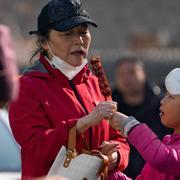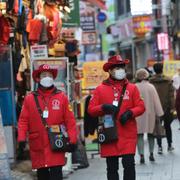
Fortsatt smittspridning i Macao – lockdown förlängs
Nedstängningen av kinesiska Macao förlängs till på fredag efter ytterligare covidfall, rapporterar AFP. Sedan utbrottet i början av juni har lokala myndigheter rapporterat 1 733 fall och restriktionerna skulle ha lyfts på måndag.
Även kasinon, som undantogs nedstängningarna de första veckorna, hålls stängda. Kasinobranschen utgör hälften av halvöns BNP och har en juridisk särställning, vilket förklarar det tidigare avsteget från Pekings nolltoleranspolitik.
Läs mer om regeringens nolltolerans
Wikipedia (en)
Zero-COVID, also known as COVID-Zero and "Find, Test, Trace, Isolate and Support" (FTTIS), is a public health policy that has been implemented by some countries during the COVID-19 pandemic. In contrast to the living with COVID-19 strategy, the zero-COVID strategy is a "control and maximum suppression" strategy. It involves using public health measures such as contact tracing, mass testing, border quarantine, lockdowns, and mitigation software in order to stop community transmission of COVID-19 as soon as it is detected. The goal of the strategy is to get the area back to zero new infections and resume normal economic and social activities.A zero-COVID strategy consists of two phases: an initial suppression phase in which the virus is eliminated locally using aggressive public health measures, and a sustained containment phase, in which normal economic and social activities resume and public health measures are used to contain new outbreaks before they spread widely. This strategy has been utilized to varying degrees by Australia, Atlantic and Northern Canada, Bhutan, mainland China, Hong Kong, Macau, New Zealand, North Korea, Singapore, Scotland, South Korea, Taiwan, Tonga, and Vietnam. In late 2021, due to challenges with the increased transmissibility of the Delta variant and Omicron variant, and also the arrival of COVID-19 vaccines, most countries stopped pursuing zero-COVID. As of July 2022, mainland China, Hong Kong, Macau, and North Korea are still pursuing a zero-COVID strategy.
Experts differentiate between zero-COVID, which is an elimination strategy, and mitigation strategies that attempt to lessen the effects of the virus on society, but which still tolerate some level of transmission within the community. These initial strategies can be pursued sequentially or simultaneously during the acquired immunity phase through natural and vaccine-induced immunity.Advocates of zero-COVID have pointed to the far lower death rates and higher economic growth in countries that have pursued elimination during the first 12 months of the pandemic (i.e., prior to widespread vaccination) compared with countries that have pursued mitigation, and argue that swift, strict measures to eliminate the virus allow a faster return to normal life. Opponents of zero-COVID argue that "it's not realistic to eliminate a respiratory virus such as SARS-CoV-2, any more than it is to eliminate the flu or the common cold." To achieve zero-COVID in an area with high infection rates, one review estimated that it would take three months of strict lockdown.
Macao
Läs mer
Omni är politiskt obundna och oberoende. Vi strävar efter att ge fler perspektiv på nyheterna. Har du frågor eller synpunkter kring vår rapportering? Kontakta redaktionen



